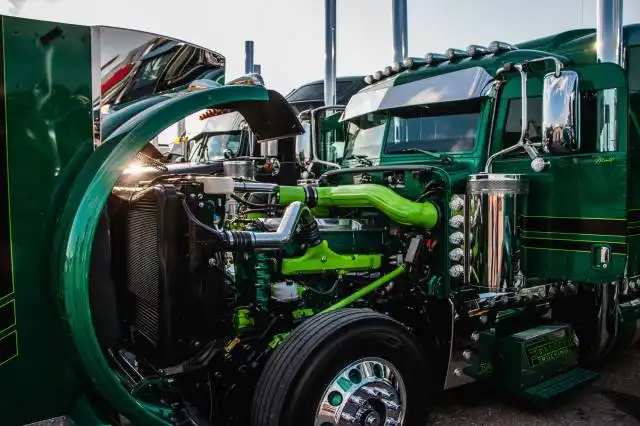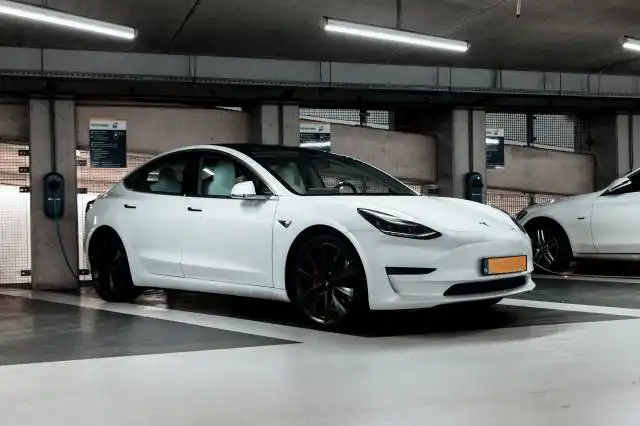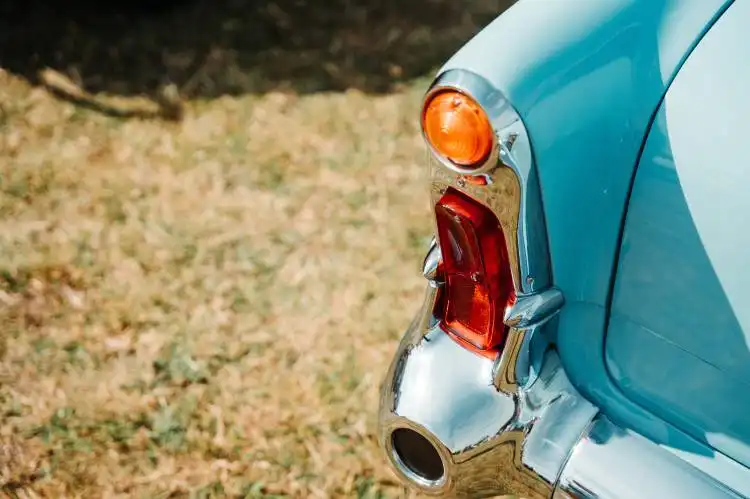Start a Custom Car Shop
Unleashing Your Creative Genius in the Automotive World
| Updated


CUSTOM CAR SHOP
The rev of an engine, the sleek body of a chassis, paints that pop, and embellishments that reflect personality - a custom car shop weaves these elements together in a symphony of self-expression and speed. This business venture caters to car enthusiasts, ready to peel out in vehicles that are not just modes of transport, but artistic visions on wheels. From minor cosmetic modifications to complete vehicle overhauls, if you are an automotive aficionado brimming with creativity, this might just be your highway to success. Embarking on this adventure, you'd inject life into people’s dream machines, tuning, tinkering, and transforming ordinary vehicles into extraordinary rides.
Jump to Business Plan
RELATED BUSINESS IDEAS
Browse ALL Cars & Transportation Solutions Business Ideas
Discover Your Perfect Domain
Unlock the door to your online success with our hand-picked selection of premium domain names. Whether you're starting a new venture or rebranding an existing one, the right domain can set the tone for your digital presence. Browse through our curated list, each with its unique potential to enhance your brand's visibility and credibility.
CUSTOM CAR SHOP MINI BUSINESS PLAN
This a quick reality check to help you identify the strengths and weaknesses of your business concept before you dive in.
Business Idea: Custom Car Shop
For the petrolhead entrepreneur, opening a custom car shop can be a dream come true. This venture combines your love for automobiles with your desire to run a business. It's time to look at this vocation not just as a motorhead, but a shrewd businessperson!
Quick Facts:
Expected Percent Margin:
- Gross Margin: 50-60% typically - automotive parts can have hefty markups!
- Net Profit Margin 10-20% expected - remember, labor and operational costs can be significant.
Earnings Expectations:
These numbers vary widely, largely based on how many cars you're customizing, and the extent of the modifications.
- Daily Earnings: $200-$1000
- Weekly Earnings: $1000-$5000
- Monthly Earnings: $4000-$20,000
- Annual Earnings: $48,000-$240,000
Actions to Achieve These Numbers:
Fire up your engines! Here's how you'll get there:
Quiet Shop, Empty Wallet. Noisy Shop, Jingle Pockets.
- Booking Management:
- Aim to have 2 cars in your shop for customization every day. Adjust according to shop size and manpower.
A-Team - Mechanics more Accurate than a Torque Wrench.
- Staffing:
- Hire skilled mechanics that can work efficiently while preserving a high standard of quality.
Penny Saved, Penny Earned. Every Part Matters.
- Inventory Management:
- Establish connections with wholesale car part suppliers. Buy smart, keep costs low and quality high.
Show Off a Bit, You've Earned It.
- Marketing & Advertising:
- Word of mouth isn't enough. Invest in social media and effective advertising to reach potential clients.
The Shop - Clean, Like the Flick of a Wiper.
- Shop Maintenance:
- Keeping your shop clean and your machines in operational condition is a must for efficiency and safety.
Client Relationships - Stronger than a Lorry's Axle.
- Customer Experience:
- Surprise and delight customers with your service. A happy customer is a returning customer (and they have friends).
Just remember, the journey of a thousand miles begins with a single gearshift. Enjoy your ride to the top!
NOT WHAT YOU HAD IN MIND? Here are more ideas



Browse ALL Cars & Transportation Solutions Business Ideas
Grab Your Business Website Name
Before you get caught up in the whirlwind of setting up your business, invest in a domain name. It's a small but significant step that lays the foundation for your brand and makes it easier for customers to find and trust you. Just like you wouldn't build a house without securing the land first, don't build a business without securing your domain name.
"Why? Can't that wait?" Here's why it shouldn't
Step 1: Determine if the Business is Right Endeavor
Breakdown of Startup Expenses
When starting a custom car shop, it is important to have a thorough understanding of the startup costs associated with the business. These costs can include the purchase of tools and equipment, the cost of renting a workspace, the cost of obtaining any necessary licenses and permits, and the cost of advertising and marketing. Additionally, it is important to factor in the cost of any materials that will be necessary for the shop, such as paint, fabric, and other materials. It is also important to consider the cost of hiring any employees that may be necessary to run the shop.
Breakdown of Ongoing Expenses
In addition to the startup costs, it is important to consider the ongoing expenses associated with running a custom car shop. These expenses can include the cost of materials, the cost of labor, the cost of insurance, the cost of utilities, and the cost of any necessary repairs or maintenance. Additionally, it is important to factor in the cost of any necessary taxes, fees, and other costs associated with running the business.
Examples of Ways to Make Money
When starting a custom car shop, it is important to consider ways to make money. This can include offering services such as custom paint jobs, custom upholstery, custom body work, and custom modifications. Additionally, the shop can offer services such as installation of aftermarket parts, detailing, and repair services. Additionally, the shop can offer products such as custom parts, accessories, and apparel. Finally, the shop can offer classes and workshops to teach customers how to customize their own vehicles.
Step 2: Name the Business
When naming your custom car shop, it is important to consider the type of cars you will specialize in, the services you will offer, and the target audience you are trying to reach. It is also important to consider the name’s availability for a trademark and domain name. You should also consider the length of the name and how it will look on a logo. Additionally, you should consider the potential for the name to be memorable and catchy. If you are having trouble coming up with a name, you can look to other successful car shops for inspiration. You can also use online tools such as name generators to help you come up with a name. Once you have a few names in mind, you should do a quick search to make sure the name is not already in use. Once you have found a name you like, you should register it with the appropriate governing bodies.
Step 3: Create a Business Plan
Creating a business plan is essential for any business, and a custom car shop is no exception. A business plan should include an executive summary, a company description, a market analysis, an organization and management plan, a service or product line, a marketing and sales plan, and a financial plan. The executive summary should provide a brief overview of the business and its goals. The company description should provide an overview of the business structure, the services or products offered, and the target market. The market analysis should provide an overview of the industry, the target market, and the competition. The organization and management plan should provide an overview of the ownership structure, the roles and responsibilities of each team member, and the management structure. The service or product line should provide a description of the services or products offered, the pricing structure, and the advantages of the services or products. The marketing and sales plan should provide an overview of the marketing and sales strategies, the budget, and the goals. Finally, the financial plan should provide an overview of the startup costs, the ongoing expenses, and the projected profits.
Step 4: Obtain Funding
Sources of Funding
In order to start a custom car shop, it is important to obtain the necessary funding. There are a variety of sources of funding available, including personal savings, bank loans, venture capital, and angel investors. Personal savings can be used to cover the initial startup costs, such as purchasing equipment and supplies. Bank loans can be used to cover larger startup costs, such as purchasing a building or hiring employees. Venture capital is a form of financing that is provided by venture capitalists, who are typically interested in investing in high-growth businesses. Angel investors are individuals who are interested in investing in businesses and typically provide larger amounts of funding.
Step 5: Secure a Location
Considerations for Choosing a Location
Securing a location for a custom car shop is an important step in the process. When choosing a location, it is important to consider factors such as the size of the space, the zoning laws, the cost of rent, and the accessibility of the location. The size of the space should be large enough to accommodate the necessary equipment and supplies. It is also important to make sure that the zoning laws allow for a business of this type. The cost of rent should be within the budget of the business. Finally, the location should be easily accessible to customers.
Step 4: Obtain Licenses and Permits
In order to open a custom car shop, there are certain licenses and permits that must be obtained. Depending on the state, these may include a business license, a sales tax permit, an employer identification number, and a zoning permit. Additionally, any special permits or licenses that are required for the type of business being conducted must be obtained. For example, if the shop will be selling parts, a parts dealer license may be required.
Where to Obtain Licenses and Permits
The licenses and permits needed to open a custom car shop can usually be obtained from the local government office. In some cases, the state government may also have to be contacted. It is important to research the specific requirements for the area in which the shop will be located, as these requirements can vary from state to state. Additionally, it is important to make sure that all licenses and permits are obtained before the shop opens, as failure to do so can result in fines and other penalties.
Cost of Licenses and Permits
The cost of the licenses and permits needed to open a custom car shop can vary depending on the state and the type of business being conducted. Generally, the cost of the licenses and permits will be a few hundred dollars. It is important to factor this cost into the overall startup expenses for the business.
Time Frame for Obtaining Licenses and Permits
The time frame for obtaining the licenses and permits needed to open a custom car shop can vary depending on the state and the type of business being conducted. Generally, it can take anywhere from a few days to a few weeks to obtain all of the necessary licenses and permits. It is important to start the process as soon as possible, as it can take some time to complete.
Step 5: Find a Location
Finding the right location for a custom car shop is essential to the success of the business. It should be in a place that is easily accessible to customers and has enough space to accommodate the necessary equipment. It should also be in an area that is zoned for automotive repair. Additionally, the location should be close to suppliers and other automotive businesses that may be able to provide assistance.
Zoning Requirements
Before signing a lease, it is important to make sure that the zoning requirements for the area allow for automotive repair. This can be done by contacting the local zoning board and asking for a copy of the zoning regulations. Additionally, it is important to make sure that the lease does not have any restrictions on the type of business that can be conducted in the space.
Cost of Rent
The cost of rent will vary depending on the location and size of the space. It is important to compare the cost of rent to the potential revenue that can be generated from the business. Additionally, it is important to consider the cost of utilities, insurance, and other expenses that may be associated with the space.
Signing a Lease
Once the right location has been found, it is important to review the lease carefully before signing. The lease should include the length of the lease, the amount of rent, and any other terms and conditions that may be applicable. Additionally, it is important to make sure that the lease is legally binding and that all parties involved understand the terms of the agreement.
Step 6: Purchase Equipment
When starting a custom car shop, it is important to purchase the right equipment. Depending on the services offered, the types of equipment needed can vary. Generally, the shop will need a lift, a compressor, a welder, a plasma cutter, and a variety of other tools and supplies. The shop should also have a computer with a good software program for designing custom parts.
Where to Purchase
When purchasing equipment for a custom car shop, it is important to shop around for the best prices. Many automotive supply stores offer discounts for bulk purchases, so it is important to compare prices. Additionally, there are many online stores that offer good deals on automotive equipment. It is also important to consider the quality of the equipment when making a purchase.
Cost
The cost of the equipment needed to start a custom car shop can vary greatly. Depending on the services offered, the cost of the equipment can range from a few hundred dollars to tens of thousands of dollars. It is important to research the cost of the equipment needed before making any purchases.
Financing Options
For those who do not have the funds to purchase the necessary equipment, there are financing options available. Many banks and other lenders offer financing for business equipment purchases. Additionally, there are many online lenders that offer financing for small business owners. It is important to compare rates and terms before making a decision.
Step 7: Market the Business
Once the business is established and running, it is important to market it to potential customers. There are a variety of ways to market a custom car shop. Examples include creating a website, using social media, attending car shows, and advertising in local newspapers and magazines. Additionally, word-of-mouth marketing is an effective way to get the word out about the business.
Establishing a Brand
When marketing the business, it is important to establish a brand. This includes creating a logo and slogan, as well as developing a unique look and feel for the business. This will help customers to recognize and remember the business. Additionally, it is important to create a mission statement and core values to help guide the business and ensure that customers know what to expect.
Developing a Network
Networking is an important part of marketing a business. It is important to establish relationships with other businesses in the industry, as well as with potential customers. This can be done by attending industry events, joining industry organizations, and reaching out to potential customers. Additionally, it is important to stay up-to-date on industry trends and news.
Creating a Budget
When marketing the business, it is important to create a budget. This will help to ensure that the business is not overspending on marketing efforts. Additionally, it is important to track the results of marketing efforts to ensure that they are effective. This will help to ensure that the business is getting the most out of its marketing budget.
Step 8: Hire Employees
Finding the right employees for your custom car shop is essential to the success of your business. You should look for employees who have experience in the automotive industry and who have a passion for cars. You should also look for employees who have a good attitude and are willing to work hard. Additionally, you should look for employees who are willing to learn and grow with your business. You should also consider offering competitive wages and benefits to attract the best employees.
Training Employees
Once you have hired the right employees, it is important to provide them with the necessary training. This should include safety training, customer service training, and technical training. You should also provide your employees with the tools and resources they need to do their job. Additionally, you should provide ongoing training and development opportunities to ensure that your employees are up to date on the latest trends and technologies in the automotive industry.
Establishing Policies and Procedures
In order to ensure that your business runs smoothly, it is important to establish policies and procedures. This should include policies regarding safety, customer service, and the use of tools and equipment. Additionally, you should establish procedures for handling customer complaints, resolving disputes, and dealing with difficult customers.
Maintaining a Positive Work Environment
Finally, it is important to maintain a positive work environment. This should include providing employees with a clean and safe workspace, recognizing their accomplishments, and rewarding them for their hard work. Additionally, you should provide employees with the opportunity to voice their opinions and provide feedback. This will help to create a positive work environment and will encourage employees to work hard and be productive.
Step 9: Monitor the Business
Monitoring the business is an important part of running a successful custom car shop. There are several ways to monitor the progress of the business. First, it is important to track the sales of the business. This can be done by keeping a detailed record of the number of cars sold, the types of cars sold, and the prices of the cars sold. Additionally, it is important to track the customer feedback. This can be done by surveying customers after they have purchased a car or by asking customers to leave reviews on the business’s website. Additionally, it is important to track the financial performance of the business. This can be done by tracking the income and expenses of the business and comparing them to the budget. Finally, it is important to track the performance of the employees. This can be done by tracking the number of cars they have worked on and the quality of their work.
Tips for Monitoring the Business
When monitoring the business, it is important to be consistent and thorough. This means that it is important to track the same metrics each month and to compare the results to the previous month. Additionally, it is important to be honest when evaluating the performance of the business. It is also important to be open to feedback from customers and employees. Finally, it is important to use the data collected to make improvements to the business. This could include changes to the pricing structure, changes to the services offered, or changes to the way the business is run.
EXPLORE MORE CATEGORIES
Browse ALL Business Idea Categories
TAKE THE NEXT STEPS










